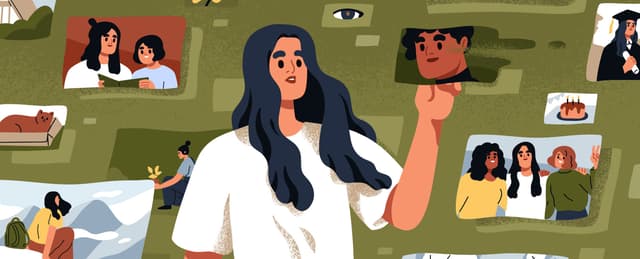Ever wondered why you recognize someone in the street but can't remember their name? Well, there's a scientific reason for it. For starters, our brains are far better equipped at storing visual data, such as a face, than a briefly heard name. “We are visual creatures,” says E. Clea Warburton, a cognitive neuroscientist at the University of Bristol. “Our brain has got more cortex devoted to processing visual information compared to that from our other senses. We are programmed to be encoding and retrieving visual information much more so than auditory information.”
Further, a face compared to a name “is really a much richer stimulus,” says Richard Russell, an assistant professor of psychology at Gettysburg College who has studied facial recognition. Visages convey a unique mixture of gender, age, ethnicity, mood, attractiveness, and more—plenty of juicy detail to soak up and help the visual memory stick. Names, meanwhile, are just a collection of several letters, and often common—and forgettable—to boot (how many Mikes and Kates do you know?).
Researchers at York University have found that our brains can remember 10,000 faces over the course of a lifetime. The average person can recall around 5000 but, the scientists say, that doesn't mean we'll always remember their names. When it comes to names, things get even more complicated. Again, try to put yourself in the position of a social scientist for a minute. How would you design an experiment that looked at the total number of names an individual could recall? I guess you could ask her/him to list the names of every person s/he could remember — but then you might not capture all the Bridgets and Bernies whose names the participant only remembers once she bumps into them on the street. And in a way, that’s kind of closer to the way real life works, right?
The amount of information the brain can store in its many trillions of synapses is not infinite, but it is large enough that the amount we can learn is not limited by the brain’s storage capacity. However, there are other factors that do limit how much we can learn. The first is our limited attention. A second factor is that the order in which we learn certain types of information matters. The things that we learn first are usually the strongest, and anything learned later will often be weaker. Finally, there are limits that have to do with our brain’s sensitivity to particular kinds of information at different points in development.
Most research has focused instead on how many people you know and can remember (along with their names). I’ll share some of it here because it’s interesting and still relevant to your question.
Ithiel de Sola Pool and Manfred Kochen were two sociologists who pioneered research on “acquaintanceship volume” — estimating the number of individuals people have in their social networks. To measure his own acquaintanceship volume, Pool carried a notebook around with him for 100 days and whenever he exchanged words (in person, over the phone or by mail) with someone he had previously met and whose name he knew, he noted the person down in the book. Each person was noted only once even if Pool interacted with him or her multiple times, so as the days passed, the growth in new names slowed. Pool then used the data to predict how many names his notebook would contain if he conducted the experiment for 20 years. Pool estimated that he would have recorded about 3,500 acquaintances by the end of two decades.
I know what you’re going to say though: Writing down names isn’t the same thing as remembering them, right? Well, Pool thought of that too. He wanted to test whether he could remember all his acquaintances. He did this by using two phone books (one for Chicago and one for Manhattan) as prompts. After randomly selecting 30 pages from each, he looked over the names on those pages and tried to think of people he knew with the same family name. He ended up remembering 3,100 acquaintances with the aid of the Chicago book and 4,250 names with the Manhattan phone book.
No one would look at a phone book now. And our closest equivalent, social media, could be influencing our memory. If anything, Facebook, Instagram and Twitter prompt you to remember more people than you would otherwise because you see their names and faces more often in your feeds.
So, there’s no known limit! If you ask a mnemonist or memory savant, they may remember thousands with no trouble, as well as lists of thousands of digits. The rest of us evolved to cope with no more than about 150 social relationships. This is known as Dunbar’s number after the anthropologist Robin Dunbar. He discovered that groups of hunter-gatherers, units in armies, divisions in businesses and many other groups tend towards a limit of 150. And it seems that social media do not change our basic nature. Even people who have thousands of 'friends' on Facebook rarely maintain more than 150 meaningful relationships.
References:
Brown, MW., Warburton, EC. & Aggleton, JP., 2010, Recognition Memory: Material, Processes, and Substrates. In: Hippocampus. 20:1228–1244.
Jenkins, R., Dowsett, AJ., & Burton, AM., 2018, How many faces do people know? Proceedings of the Royal Society B, 285(1888), 20181319.
Russell R, Duchaine B, Nakayama K., 2009, Super-recognizers: people with extraordinary face recognition ability. In Psychonomic Bulletin & Review 16 (2): 252-7.
de Sola Pool I., Kochen M., 1979, Contacts and influence. In Social Networks 1(1): 5-51.
Lindenfors P., Wartel A., Lind J., 2021, ‘Dunbar's number’ deconstructed. In Biology Letters 17: 20210158. 20210158

